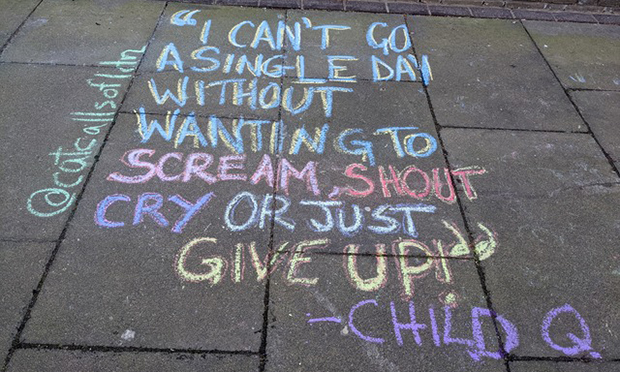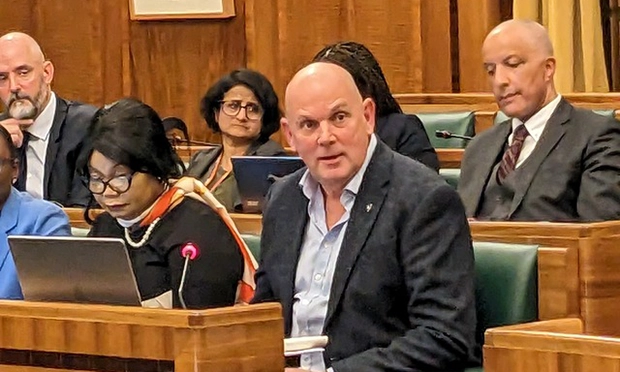‘Why was it me?’ Child Q still haunted by school strip-search, safeguarding expert reveals in hard-hitting report

The words of Child Q written on a pavement by protesters. Photograph: Julia Gregory
The Black teenager at the centre of the Child Q scandal is still asking why she was strip-searched by police at her school, a safeguarding expert has revealed.
The girl was taken out of a mock exam in 2020 and searched without an appropriate adult present after her school called in police when they wrongly believed she had cannabis on her.
She is haunted and traumatised by what happened.
Jim Gamble, Hackney’s independent child safeguarding commissioner, spoke to more than 100 local children and their parents and carers to find out what has changed in policing and education since the scandal first came to light.
His new report “highlights the lack of trust there can be in the police, in some schools and in most statutory agencies”.
Gamble warned: “Simply ignoring or minimising their concerns, as some seem tempted to do, will not deliver improvement.”
He said what the teenage pupil experienced “remains a weight on her shoulders. Child Q is still asking herself, “Why was it me?”
“This young person has shown remarkable courage and resilience. I believe we need to give her time and space to grow and build her own life. We owe this to her.
“Others now need to take up the challenge of delivering change.”
He added: “Would this have happened to a blond-haired, blue-eyed girl in South Kensington? I do not think it would.”
He noted there was initially “defensiveness” from the police and Child Q’s school when he first investigated.
Since the scandal broke, no child in Hackney has had what is known as a ‘more intimate search exposing body parts’ (MTIP), and the numbers across London have dropped by 45 per cent.
In his new report, published today, Gamble has issued a further 13 recommendations, including that the police consider arresting children if they feel an MTIP search is necessary so it can be carried out at a police station.
He stressed that “strip-searches should never take place in schools”.
He explained that if searches are done at a police station it “will ensure supervision takes place, authorisation is confirmed, an appropriate adult or parent or carer is present, and monitoring of the process is stringently applied”.

Independent safeguarding commissioner Jim Gamble. Photograph: Julia Gregory
Gamble said the Metropolitan Police needs to “acknowledge institutional racism” and look at ways to tackle it as part of its plans to get out of special measures.
The force should also involve local people in appointing borough commanders “to help decide who is the best fit”.
He said this ” would promote a degree of ownership from communities and would likely create a much stronger foundation upon which trust and confidence in local leadership could develop”.
Gamble also told the Department for Education to spell out the “exceptional circumstances” where strip-searches are needed, and called for headteachers to prepare a list of banned items in schools.
Ofsted inspectors should also routinely test schools’ searching, screening and confiscation of prohibited items.
The safeguarding expert praised the “unswerving focus” of Hackney’s voluntary and community sector and its “outstanding” role in supporting children.
He said Child Q’s former school has brought back the school council, started safeguarding support, and introduced staff training about adultification, whereby children, especially Black youngsters, are treated as grown-ups.
He found “strong leadership” at Hackney Council and hailed its role in “driving activity and holding other organisations to account”.
He wants to see the council develop a strategy to oversee work to eradicate racism.
Hackney Mayor Philip Glanville, Deputy Mayor Anntoinette Bramble and community safety chief Cllr Susan Fajana-Thomas welcomed the recommendation.
They pledged: “We will listen to and act upon what our children and their families are telling us. But we can’t do this alone, and will need the education system to support this work.”
The politicians said the community has “given one clear message: Black and Global Majority people face or feel racism and suffer injustice from all statutory institutions. Indeed, Child Q was right when she said all organisations bear responsibility for what happened to her, and must change.”
Three years on from the scandal, the council aims to “take this as a further opportunity to continue to examine our own practices. Is some of the work we carry out too punitive? Where are we behaving in an unfair way? Where are we failing to treat our residents with the respect they deserve? And, how are our systems racist or leading to racist outcomes?”
Hackney’s borough commander, Detective Chief Superintendent James Conway, said police must take a “child-centred” approach.
He said: “The experience of Child Q should never have happened and I am sorry for the trauma that we caused her, and I am also sorry it took an event like this to highlight that we were overusing this type of strip-search on children.
“The report correctly identifies the need for a child-centred approach and the crucial need for police to be careful and proportionate in the use of all of our powers. This is even more important for the most intrusive searches, such as these types of strip-search, and especially when involving children. We should not have needed an incident such as Child Q to check our approach.
“While we have made notable practical improvements, such as requiring more senior levels of authorisation, what happened to Child Q illustrates why public scrutiny is so crucial in checking how we use our powers.
“We should never tire of testing that we are policing with the consent of the public.”
He said the force has been “working hard” to listen to communities and added: “We wish these types of searches were not necessary but sadly we know there are children in London being exploited to carry drugs and weapons for others as well as involved in criminality.
“Work locally and across the Met has significantly reduced the use of this type of search, as the report identifies.
“There is, of course, more to do and we will continue our conversations with communities, and particularly young people, to ensure our policing response reflects their needs, whilst meeting public safety.”
